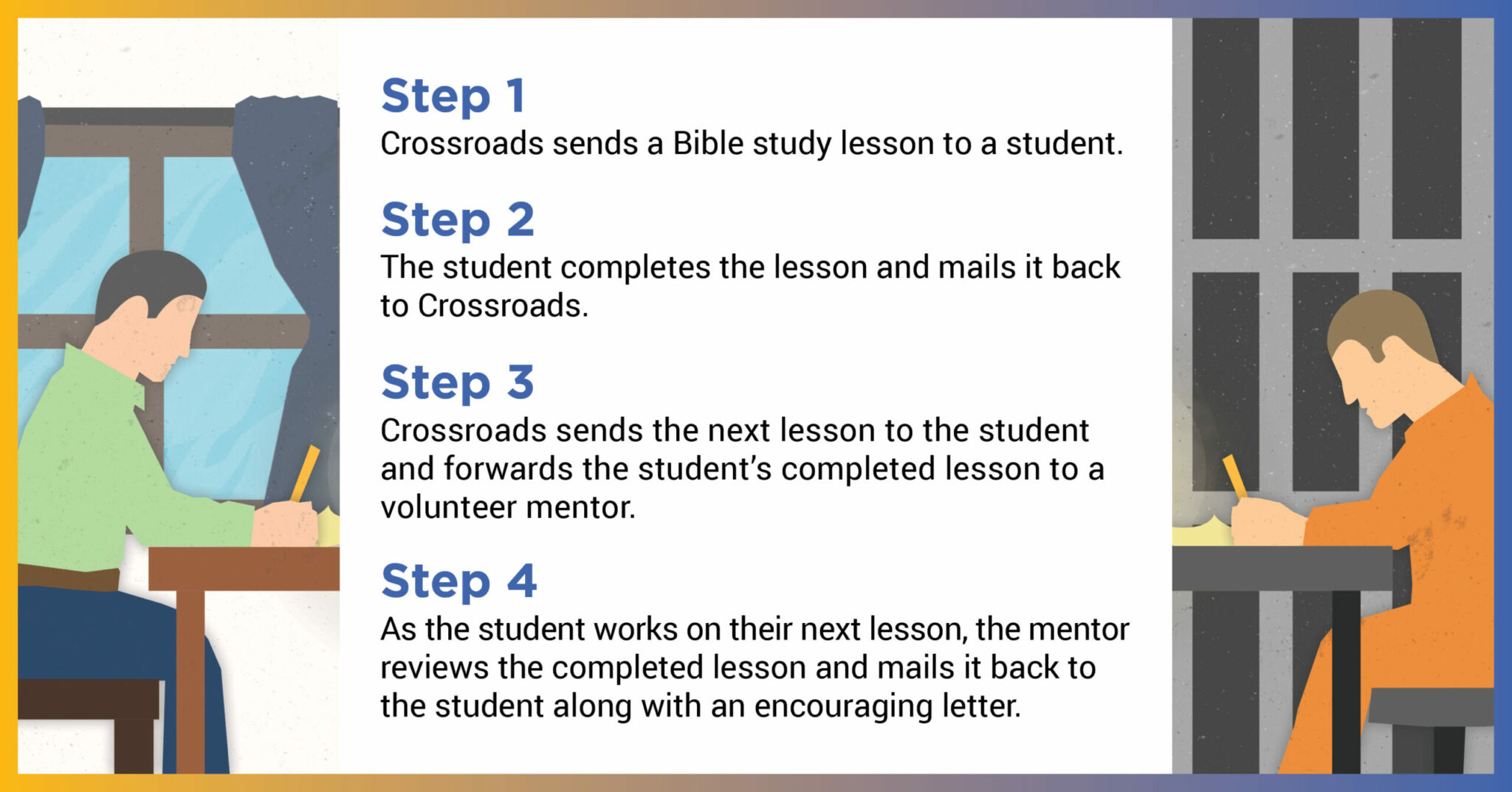Mail-based mentors support prosocial behavior in prisons
Three primary risk factors for arrest and incarceration are a person’s antisocial beliefs, attitudes, and associations. Rehabilitation strives to help people with a history of such risk factors to think and act in prosocial ways that strengthen the community where they will live after they are released from prison.
With the development of the Prisoner Reentry Initiative (PRI) in the early 2000s, mentoring has been recommended as a key program component for prosocial orientation and successful community reintegration.
Sources of volunteer mentors
Faith-based organizations are a reliable source of volunteer mentors for both in-prison and correspondence-based mentoring programs. Volunteer mentors from churches offer a cost-effective way for facilities to incorporate evidence-based practices and provide much-needed prosocial connections for their populations.
The COVID-19 pandemic shed light on the value of correspondence-based mentoring programs. With the arrival of the pandemic and subsequent pause on in-person programs, correspondence-based mentoring programs provided a much-needed prosocial lifeline to the outside for men and women behind bars. Mail-correspondence programs offered learning opportunities and meaningful interaction without interruption or any reduction in enrollment. In Crossroads Prison Ministries’ internal surveys of students, dozens of students said Crossroads’ correspondence-based program was the only contact they had with the outside world during the height of the pandemic.
Through the height of the pandemic in 2020 and 2021, more than 50,000 students enrolled in Crossroads as they searched for every possible way to remain occupied and connected to the outside world amid intense isolation. What sets Crossroads and similar ministries apart from other pen-pal or correspondence Bible study programs is a focus on addressing dynamic criminogenic risk by modeling prosocial behavior through mentoring relationships. A Minnesota study by Duwe & King (2012) concluded that faith-based programs can be effective when criminogenic risk factors are targeted.
Look for programs with strong training
Crossroads has several program components designed to maximize effectiveness. All volunteer mentors go through a rigorous application and training process. Mentors with experience working with people with mental health needs are placed into a specialized mentor pool and connected with students who might be dealing with immediate emotional distress. Crossroads requests wellness checks for students who might be discussing suicide, for instance. Typically, facility chaplains, mental health professionals, and caseworkers are the main points of contact in these circumstances.
Unintended consequences of mail restrictions
Anything that can prevent even one injury from drug use within a facility should be considered. Toward that goal, a growing number of facilities are moving to electronic delivery of mail to stop the introduction of drugs through facility mail rooms.
An unintended consequence of mail restrictions is that many students of correspondence learning and mentoring programs are losing access to those programs. More than 150 facilities in the United States no longer accept mailings from Crossroads, affecting more than 1,000 Crossroads students.
Wardens agree that cutting students off from their lessons and mentors is not the intent of the mail restrictions and have been discussing how to keep those programs operational. Crossroads is working to develop new delivery methods to stay ahead of the wave of changes. But, in the end, receiving a scanned or digital letter or lesson is not the same as being able to hold an original document in one’s hand.
What facilities can do
As Crossroads prepares for the future, we endeavor to work in concert with facilities and chaplains to provide programming that is safe and effective.
Consideration needs to be given to mentor-correspondence ministries like Crossroads to permit mailed lesson booklets and mentor correspondence with incarcerated men and women through traditional mail services. The prosocial benefits of programs like Crossroads are too valuable to risk losing. It is important for mentor-correspondence ministries to collaborate with facility staff to ensure they continue. We urge corrections leaders to recognize the value of mentorship in all forms and examine ways that beneficial programs like Crossroads can safely continue supporting the rehabilitation of men and women behind bars.
Additional resource
Duwe, G. & King, M. (2012) “Can Faith-Based Correctional Programs Work? An Outcome Evaluation of the InnerChange Freedom Initiative in Minnesota.” International Journal of Offender Therapy and Comparative Criminology, 57(7)
About the author: John Byrne has worked in prison ministry for nearly thirty years, spending much of his career with Prison Fellowship. John currently serves as the student programming director at Crossroads Prison Ministries, a mail-based mentorship and Bible study program that serves more than 25,000 men and women in the United States annually. To learn more, visit www.cpministries.org.
Recommend Crossroads for your facility today.
Learn more about the importance of mentors through mail correspondence: About the program – Crossroads Prison Ministries (cpministries.org)
Introduce Crossroads at your facility
Request an information packet to be sent to your facility chaplain or religious services office:
Tips for selecting mail-based mentorship programs:
How frequently will your residents receive letters?
- Programs should be able to ensure at least one piece of outreach a month.
What messages are emphasized?
- Programs that encourage prosocial attitudes and behaviors are essential. Messages from mentors need to encourage self-reflection, honesty, and a willingness to change.
What training do mentors receive?
- Be sure to select programs that offer training, support, and oversight.
How much time will this require of my staff?
- Mail-based programs require much less time from your staff than in-person church volunteer programs.
Is there a cost to students?
- The best programs have enough donor support to offer their programming for free.
How is the program evaluated?
- Look for programs that offer students the opportunity to provide feedback throughout their experience. Effective mail-based programs operate on a continuous improvement model.
Electronic lessons are available for facilities that no longer distribute physical mail. Contact us at info@cpministries.org to learn more.
How the Crossroads Program Works

